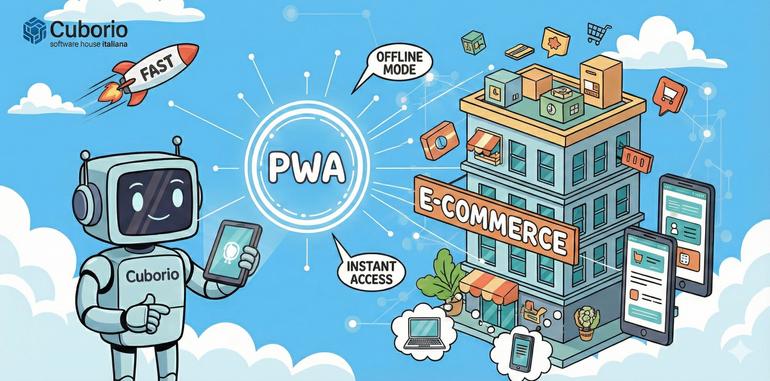Google introduced progressive web app technology in 2015 and still supports PWA websites, allowing customers to access the Google web page and set the app icon on the phone's home screen.
As such, this technology has a number of SEO benefits, including improved website loading speed. Not to mention that progressive apps are outstanding digital marketing tools for ecommerce.
Your ecommerce marketing can benefit from this technology by sending push notifications and offering offline support to your customers.
Why your eCommerce needs progressive web app development
The best advantage that progressive web apps bring to eCommerce is the ability to have an app without having to invest heavily in native mobile app development.
You don't have to adapt your app to different requirements and receive app shop approvals, an essential step when releasing apps for Android, iOS and Windows, and you don't have to invest in app shop optimisation (ASO).
Progressive Web Apps are SEO-friendly and your customers will use them without entering the app shops.
The Cuborio PWA will appear as a mobile variant of the website, but the cloud-based innovation behind it will produce a native-like experience for users. This is the fastest way to achieve the necessary degree of digital acceleration while maintaining high security standards and satisfying your customers on their smartphones.
Even if your service currently has a native application (or any other e-commerce web application), adopting a progressive web application will improve key engagement metrics.
3 main advantages of Progressive Web Apps for e-commerce
Progressive web apps are based on the HTTPS communication procedure, which allows customers to make payments without having to switch from a mobile app to a desktop.
Lightness.
Progressive web apps are lighter than native apps, which results in faster loading, automated beverages and a better user experience. They are easy to find and quick to download, have no slowdowns and can also work offline. Most companies using this technology have reduced the size of their apps by 80-99% compared to the size of the preliminary mobile app.
Attract web traffic.
Progressive web apps have their own URL, are available in search engine results and allow SEO professionals to take care of their efficiency. Because of this, it is an effective solution for e-commerce website development.
Fully functional browser-based application.
A progressive web application looks like a native application, but is as easy to access as a mobile website. At the same time, it requires no technical complexity to provide a satisfactory user experience. Progressive apps do not use a lot of information and can work even in places with a poor web connection.
Conclusions
Although progressive web apps look like mobile websites, they should have additional functionality similar to native apps to ensure the necessary level of quality user experience.
Push notifications and app installation are indispensable features, while GEO fencing is optional.
With a progressive web app, eCommerce should save significantly on app development, as this tool does not require separate creation, maintenance and promotion for different app shops and platforms.
The aim of the evolution of PWAs is to offer a combined platform for numerous channels that a single team can take care of. This suggests combining the crucial features of native apps into a single platform that works seamlessly on any device and operating system and remains compliant with existing SEO.







